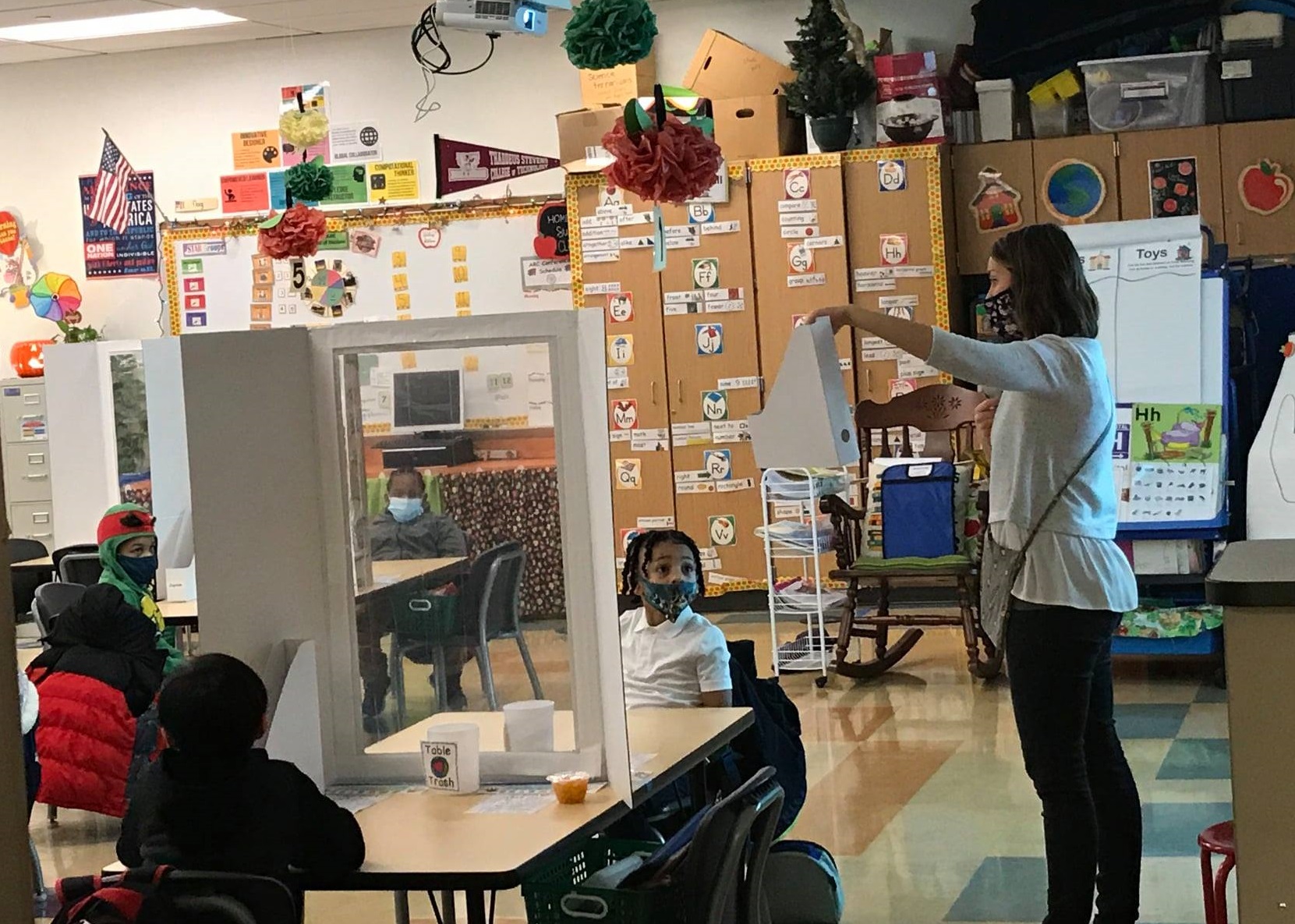
For a group of people used to consistently advocating for students, self-advocacy typically takes a backseat. Our educators, counselors and staff members deserve advocacy right now — so I wanted to speak out on their behalf.
Our society often shares stories of school staff members going above and beyond the duties of their jobs to better support our students. This comes naturally to them. They share a deep passion for their profession and genuinely care about helping students be successful, thriving members of society.
Time after time, our local school staff members have risen to meet new challenges without complaint. They have stepped up so many times, perhaps, that this behavior has come to be expected of them. They’ve been asked over and over to sacrifice themselves, their physical and mental health, their safety, and even their paychecks to help provide a better educational experience for our students.
But where do those expectations cross the line? When do we step back to honestly observe a struggling group of people who truly are a school’s greatest asset, and say ‘enough is enough?’ When do we step back and say, ‘wait — what are we actually doing here? How is this even remotely acceptable?’
We’re normalizing and minimizing a critical problem that, more and more each day, begs to be addressed. We’re ignoring promises initially voted upon in school boards across our county as they developed reopening plans. These plans were never set in stone. They were designed with flexibility to allow us to respond to rising cases in a way that helps protect staff as things significantly change.
We say we are prioritizing education for our students — that we are putting our students first — but that is not what we are doing here.
We aren’t prioritizing education until we prioritize our educators. Until we value taking care of the staff members who foster the environment that provides for educational excellence.
COVID-19 is moving much more quickly than we are. According to Johns Hopkins University, the U.S. has surpassed 10 million coronavirus cases. As of this week, more than 240,000 people have died nationwide, including a beloved school counselor within our county.

This latest, very personal hit is a sobering reminder of just how serious the pandemic is and how critical it is that we work together to increase safety measures and save lives. Alexandra Chitwood was a dedicated counselor and a student advocate who impacted and improved so many lives. Her loss is a significant one and has had an equally significant ripple effect on countless students, counselors, and educators across our community.
Locally, our “Level of Community Transmission Table," designed to be used to determine appropriate educational instructional models during Covid-19 indicated as of Nov. 9 that Lancaster County case numbers are “substantial." REMOTE ONLY learning is the suggested course of action for ANY communities entering “substantial community spread.”
According to the Kaiser Family Foundation, almost 1 out of every 4 educators are at risk of developing a serious or life-threatening illness if they contract coronavirus.
It’s important to remember, as we see new cases appearing in our school districts each day, that there are many cases going unseen, as well. Unseen — but in the building; a potential exposure for faculty and staff members who could be more deeply impacted by the virus.
In one study (Haiyan Qiu et al., The Lancet Infectious Diseases, June 2020) researchers learned that almost 30% of children with Covid-19 were asymptomatic and nearly two-thirds lacked fevers.
“Although all pediatric patients in our cohort had a mild or moderate type of COVID-19, the large proportion of asymptomatic children indicates the difficulty in identifying pediatric patients who do not have clear epidemiological information, leading to a dangerous situation in community-acquired infections,” they wrote.
At this point, by continuing to hold school (even in a hybrid model) we are recklessly ignoring scientific evidence and advice of medical experts designed to help protect school staff and our students.
We’re also ignoring guidelines from the state — which local school boards used to establish reopening plans and get them approved. What kind of message does it send if we are willing to set aside these guidelines now?
Staff members accepted having little voice in local school districts’ reopening plans, they have attempted to choose their jobs (even at the risk of their own families), many have tackled teaching students online and in-person at the same time when they were told (just before school) that they had to. They have banded together to provide emotional support for students and colleagues on a level never required before. And now, as cases continue to rapidly increase, we are increasing the chances that as they do those things, they are also risking their lives.
Perhaps it comes down to a moral obligation rather than a professional one. Quite simply put, nothing is worth risking a life.
The environment school staff members enter each day places impossible standards and mounting pressures on their shoulders — especially after losing a local colleague. My husband, a staff member at Manheim Township High School, has seen teachers and counselors in tears regularly — tears of frustration, worry and mourning.
Staff are at a breaking point and cannot maintain this stressful, frantic pace. They are taking on roles of teacher, janitor, counselor, and technology specialist. They are covering multiple classes — often classes they do not know how to teach — as other staff members are continuously and unexpectedly out and substitutes are unavailable in such large quantities.
I, too, have observed multiple board meetings where emotional teachers pour their hearts out and express genuine fear and concern — simply begging to be heard and respected.
Schools who respect their educators must take a hard look at things like toxic positivity, PTSD, anxiety disorders, mental health, individual medical concerns, high-risk families, and the value of human lives. They should shut down temporarily as they did last spring, when case numbers were lower than they are now.
It’s time for Lancaster County schools to give their staff the same respect and time they so selflessly give each day, and to prioritize their protection. Covid-19 case numbers are too high for any other solution at this time.
With the potential of a vaccine on the horizon from Pfizer, we look ahead with some renewed hope that the end of this unprecedented time is in sight, and we can more carefully consider our actions and their ripple effects in the meantime as cases spike. We have a responsibility to do our part in curbing this virus to better protect educational institutions, staff, students, and families for the future.
Unlike physicians, teachers, counselors, and support staff can effectively conduct their work from the safety of home, doing their part to reduce the spread at such a pivotal time. And they should be given the opportunity to do so.
Without the promise of safety and support within our district’s school buildings, they may effectively be deemed “open,” but there is very little quality learning or proper engagement occurring. If we truly want what is best for our students, we must begin by asking what our teachers and counselors need to do their jobs well during this pandemic — and then taking action. Some of these needs may include:
- Access to mental health support services
- Increased down time during work hours to allow for additional planning
- Increased communication from administrators and more opportunities to have their voices heard / valued
- The opportunity to perform their jobs remotely, and fully transition to online learning to provide the best educational experience possible within current circumstances
Remote work should be allotted and supported from now until at least two weeks after the new year, as the holidays will undoubtedly consist of family gatherings and, unfortunately, increased spread of the virus. Our goal should be, above all else, to prevent that spread from coming into our schools. And this rests solely within our hands.
One of the most heartbreaking things I have heard from teachers lately is that they simply do not feel valued. They feel disposable to their school districts — replaceable. Like just another cog in the wheel of an institution who is striving to scrape together some semblance of normalcy right now. It is time to forget that farce and look at facts, because things are far from normal and it is critical that school staff members feel respected.
According to the latest Gallup poll, teachers who feel supported and cared about by administrators are more likely to be top performers. There is a direct correlation between appreciated staff members and quality education for students.
These findings aren’t revolutionary. If we don’t take care of MT staff, they will be unable to take care of our students. And if we don’t take care of this generation of students, one whose innovation and passion require cultivation to solve the massive economic, social, political and environmental challenges ahead of them, we are failing them.
Students thrive when teachers, counselors, and support staff thrive — and it’s time that we step up to ensure that we can help them thrive in this unprecedented environment. We must set the standard when it comes to caring for the staff members in our local schools. In doing so, we will showcase a critical mark of leadership. One that also prioritizes and impacts the health and wellbeing of our surrounding community. One that we all deserve. It’s time to prioritize, protect and plan ahead for the future of quality education.





